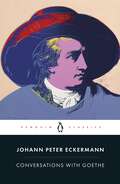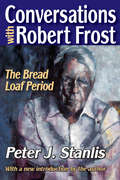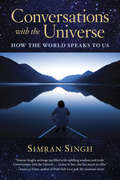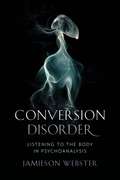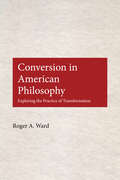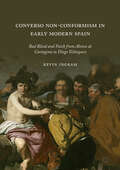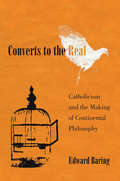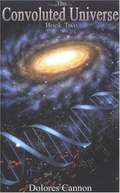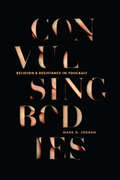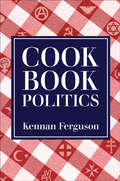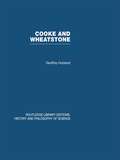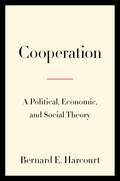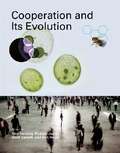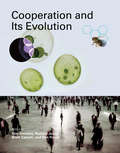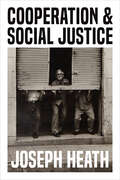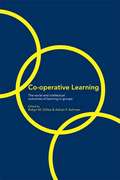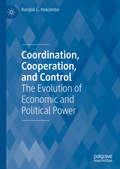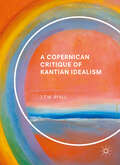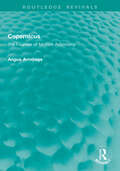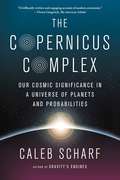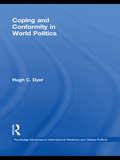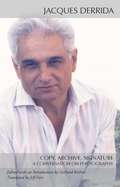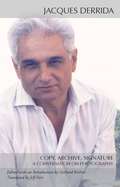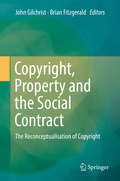- Table View
- List View
Conversations with Goethe
by Johann Peter EckermannA perceptive introduction to the mind of one of German's greatest writers, in a new translation for the first time in 150 years'The best German book there is' Nietzsche By the turn of the nineteenth century, the poet, novelist and thinker Johann Wolfgang von Goethe was one of the most famous people in the world. In 1823 he became friend and mentor to the young writer Johann Eckermann, who, for the last nine years of Goethe's life, recorded their wide-ranging conversations on art, literature, science and philosophy. This rich portrait of Germany's literary elder statesman, now in its first new translation for over 150 years, gives a fascinating glimpse into a great mind as well as 'many insights and invaluable lessons about life.'Translated by Allan Blunden with an Introduction by Ritchie Robertson
Conversations with Robert Frost: The Bread Loaf Period
by Peter StanlisThese core conversations between Peter Stanlis and Robert Frost occurred during 1939-1941. They are written in the much larger context of nearly a quarter century of friendship that ended only with the passing of Frost in 1963. These discussions provide a unique window of opportunity to appreciate the sources of Frost's philosophical visions, as well as his poetic interests. The discussions between Stanlis and Frost were held between six consecutive summers (1939-1944), when Stanlis was a student at the Bread Loaf Graduate School of English. These were augmented by additional exchanges at Bread Loaf in 1961-1962. These conversations provide original insights on important subjects common to both men. Frost insisted that it was impossible to make a complete or final unity out of the conflicts between spirit and matter. Ordinary empirical experience and rational discursive reason and logic could not harmonize basic conflicts. He held that the best method to ameliorate apparent contradictions in dualistic conflicts was through the "play" of metaphorical thinking and feeling. Metaphors included parables, allegories, fables, images, symbols, irony, and the forms and techniques of poetry such as rhyme, rhythm, assonance, dissonance, personifications, and connotations. These are the arsenal from which poets draw their insightful metaphors, but such metaphors are also the common property of every normal person. A poem is "a momentary stay against confusion," a form of revelation for "a clarification of life," but not a final, absolute answer to the mysteries and complexities in man's life on Earth. So too - at their best - are science, religion, philosophy, education, politics, and scholarship as a means of ameliorating human problems.
Conversations with the Universe
by Simran SinghThis book reveals how repetitions, coincidence and synchronicity are part of a personal conversation from the Universe, intended to provide ease and guidance. We are not alone, nor have we been creating life experiences on our own. There is a co-creative Universal Intelligence who is very much involved and continually seeking a dialogue. The problem is not so much the life challenges, but our own individual lack of communication with our co-creator. A conversation is happening all of the time, but we must open our eyes and ears to it. When we do, an opportunity to reconnect with the lighter side of life ensues. We do not have to get wrapped up in the heaviness. Instead of becoming overwhelmed by the issues at hand, we can become aware of the answers and solutions constantly presenting themselves. The Universe wants us to be joyful, have fun, and let go. The synchronicities, symbols, and messages are always intended to guide us. They are there to make us smile, to stop to remember there is more to life than the current object of our perceptions. Instead of having to work things out, we can play them out, yielding more aligned outcomes and a greater experience. When we are able to remember the vast connection that exists, the illusions we live become more and more apparent. Greater awareness of the messages and engagement in the dialogue allows us to laugh with the heavens at ourselves at life and our seriousness.
Conversion Disorder: Listening to the Body in Psychoanalysis
by Jamieson WebsterConversion disorder—a psychiatric term that names the enigmatic transformation of psychic energy into bodily manifestations—offers a way to rethink the present. With so many people suffering from unexplained bodily symptoms; with so many seeking recourse to pharmacological treatments or bodily modification; with young men and women seemingly willing to direct violence toward anybody, including themselves—a radical disordering in culture insists on the level of the body.Part memoir, part clinical case, part theoretical investigation, this book searches for the body. Is it a psychopathological entity; a crossroads for the cultural, political, and biological in the form of care; or the foundation of psychoanalytic work on the question of sexuality? Jamieson Webster traces conversion’s shifting meanings—in religious, economic, and even chemical processes—revisiting the work of thinkers as diverse as Benjamin, Foucault, Agamben, and Lacan. She provides an intimate account of her own conversion from patient to psychoanalyst, as well as her continuing struggle to apprehend the complexities of the patient’s body. When listening to dreams, symptoms, worries, or sexual impasses, the body becomes a defining trope that belies a vulnerable and urgent wish for transformation. Conversion Disorder names what is singular about the entanglement of the fractured body and the social world in order to imagine what kind of cure is possible.
Conversion in American Philosophy: Exploring the Practice of Transformation (American Philosophy #No. 13)
by Roger WardIn this fresh, provocative account of the American philosophical tradition, Roger Ward explores the work of key thinkers through an innovative and counterintuitive lens: religious conversion. From Jonathan Edwards to Cornel West, Ward threads the history of American thought into an extended, multivalent encounter with the religious experience. Looking at Dewey, James, Peirce, Rorty, Corrington, and other thinkers, Ward demonstrates that religious themes have deeply influenced the development of American philosophy.This innovative reading of the American philosophical tradition will be welcomed not only by philosophers, but also by historians and other students of America's religious, intellectual, and cultural legacy.
Converso Non-Conformism in Early Modern Spain: Bad Blood and Faith from Alonso de Cartagena to Diego Velázquez
by Kevin IngramThis book examines the effects of Jewish conversions to Christianity in late medieval Spanish society. Ingram focuses on these converts and their descendants (known as conversos) not as Judaizers, but as Christian humanists, mystics and evangelists, who attempt to create a new society based on quietist religious practice, merit, and toleration. His narrative takes the reader on a journey from the late fourteenth-century conversions and the first blood purity laws (designed to marginalize conversos), through the early sixteenth-century Erasmian and radical mystical movements, to a Counter-Reformation environment in which conversos become the advocates for pacifism and concordance. His account ends at the court of Philip IV, where growing intolerance towards Madrid’s converso courtiers is subtly attacked by Spain’s greatest painter, Diego Velázquez, in his work, Los Borrachos. Finally, Ingram examines the historiography of early modern Spain, in which he argues the converso reform phenomenon continues to be underexplored.
Converts to the Real: Catholicism and the Making of Continental Philosophy
by Edward BaringPhenomenology has the strongest claim to the mantle of continental philosophy. Edward Baring shows that credit for its prodigious growth goes to a surprising group of early enthusiasts: Catholic intellectuals. Tracing debates in Europe from existentialism to speculative realism, he shows why European philosophy bears the mark of Catholicism.
The Convoluted Universe: Book Two
by Dolores CannonBuckle your seat belts and get ready for another roller coaster ride that will present new concepts and either threaten or expand your belief systems. Dolores Cannon continues to uncover complicated metaphysics, creating the need for sequels. Included in this book: Hidden Underground Cities; Energy and Creator Beings; Time Portals for Travelling Between Dimensions; Life on Other Planets; The Universal Language of Symbols; Splinters and Facets of the Soul; Raising of Vibrations and Frequencies to Shift into the New Earth; Characteristics of the New Earth.
Convulsing Bodies: Religion and Resistance in Foucault
by Mark D. JordanBy using religion to get at the core concepts of Michel Foucault's thinking, this book offers a strong alternative to the way that the philosopher's work is read across the humanities. Foucault was famously interested in Christianity as both the rival to ancient ethics and the parent of modern discipline and was always alert to the hypocrisy and the violence in churches. Yet many readers have ignored how central religion is to his thought, particularly with regard to human bodies and how they are shaped. The point is not to turn Foucault into some sort of believer or to extract from him a fixed thesis about religion as such. Rather, it is to see how Foucault engages religious rhetoric page after page—even when religion is not his main topic. When readers follow his allusions, they can see why he finds in religion not only an object of critique, but a perennial provocation to think about how speech works on bodies—and how bodies resist. Arguing that Foucault conducts experiments in writing to frustrate academic expectations about history and theory, Mark Jordan gives equal weight to the performative and theatrical aspects of Foucault's writing or lecturing. How does Foucault stage possibilities of self-transformation? How are his books or lectures akin to the rituals and liturgies that he dissects in them? Convulsing Bodies follows its own game of hide-and-seek with the agents of totalizing systems (not least in the academy) and gives us a Foucault who plays with his audiences as he plays for them—or teaches them.
Cookbook Politics
by Kennan FergusonAn original and eclectic view of cookbooks as political actsCookbooks are not political in conventional ways. They neither proclaim, as do manifestos, nor do they forbid, as do laws. They do not command agreement, as do arguments, and their stipulations often lack specificity — cook "until browned." Yet, as repositories of human taste, cookbooks transmit specific blends of flavor, texture, and nutrition across space and time. Cookbooks both form and reflect who we are. In Cookbook Politics, Kennan Ferguson explores the sensual and political implications of these repositories, demonstrating how they create nations, establish ideologies, shape international relations, and structure communities.Cookbook Politics argues that cookbooks highlight aspects of our lives we rarely recognize as political—taste, production, domesticity, collectivity, and imagination—and considers the ways in which cookbooks have or do politics, from the most overt to the most subtle. Cookbooks turn regional diversity into national unity, as Pellegrino Artusi's Science in the Kitchen and the Art of Eating Well did for Italy in 1891. Politically affiliated organizations compile and sell cookbooks—for example, the early United Nations published The World's Favorite Recipes. From the First Baptist Church of Midland, Tennessee's community cookbook, to Julia Child's Mastering the Art of French Cooking, to the Italian Futurists' proto-fascist guide to food preparation, Ferguson demonstrates how cookbooks mark desires and reveal social commitments: your table becomes a representation of who you are.Authoritative, yet flexible; collective, yet individualized; cooperative, yet personal—cookbooks invite participation, editing, and transformation. Created to convey flavor and taste across generations, communities, and nations, they enact the continuities and changes of social lives. Their functioning in the name of creativity and preparation—with readers happily consuming them in similar ways—makes cookbooks an exemplary model for democratic politics.
Cooke and Wheatstone: And the Invention of the Electric Telegraph (Routledge Library Editions: History & Philosophy of Science)
by Geoffrey HubbardOriginally published in 1965. Charles Wheatstone collaborated with William Cooke in the invention and early exploitation of the Electric Telegraph. This was the first long distance, faster-than-a-horse messenger. This volume gives an account of the earlier work on which the English invention was founded, and the curious route by which it came to England. It discusses the way in which two such antagonistic men were driven into collaboration and sets out the history of the early telegraph lines, including work on the London and Birmingham Railway and the Great Western Railway.
Cooperation: A Political, Economic, and Social Theory
by Bernard E. HarcourtLiberal democracy is in crisis around the world, unable to address pressing problems such as climate change. There is, however, another path—cooperation democracy. From consumer co-ops to credit unions, worker cooperatives to insurance mutuals, nonprofits to mutual aid, countless examples prove that people working together can extend the ideals of participatory democracy and sustainability into every aspect of their lives. These forms of cooperation do not depend on electoral politics. Instead, they harness the longstanding practices and values of cooperatives: self-determination, democratic participation, equity, solidarity, and respect for the environment.Bernard E. Harcourt develops a transformative theory and practice that builds on worldwide models of successful cooperation. He identifies the most promising forms of cooperative initiatives and then distills their lessons into an integrated framework: Coöperism. This is a political theory grounded on recognition of our interdependence. It is an economic theory that can ensure equitable distribution of wealth. Finally, it is a social theory that replaces the punishment paradigm with a cooperation paradigm.A creative work of normative critical theory, Cooperation provides a positive vision for addressing our most urgent challenges today. Harcourt shows that by drawing on the core values of cooperation and the power of people working together, a new world of cooperation democracy is within our grasp.
Cooperation and Its Evolution
by Kim Sterelny Brett Calcott Ben Fraser Richard JoyceThis collection reports on the latest research on an increasingly pivotal issue for evolutionary biology: cooperation. The chapters are written from a variety of disciplinary perspectives and utilize research tools that range from empirical survey to conceptual modeling, reflecting the rich diversity of work in the field. They explore a wide taxonomic range, concentrating on bacteria, social insects, and, especially, humans. Part I ("Agents and Environments") investigates the connections of social cooperation in social organizations to the conditions that make cooperation profitable and stable, focusing on the interactions of agent, population, and environment. Part II ("Agents and Mechanisms") focuses on how proximate mechanisms emerge and operate in the evolutionary process and how they shape evolutionary trajectories. Throughout the book, certain themes emerge that demonstrate the ubiquity of questions regarding cooperation in evolutionary biology: the generation and division of the profits of cooperation; transitions in individuality; levels of selection, from gene to organism; and the "human cooperation explosion" that makes our own social behavior particularly puzzling from an evolutionary perspective.
Cooperation and Its Evolution (Life and Mind: Philosophical Issues in Biology and Psychology)
by Kim Sterelny Richard Joyce Brett Calcott Ben FraserEssays from a range of disciplinary perspectives show the central role that cooperation plays in structuring our world.This collection reports on the latest research on an increasingly pivotal issue for evolutionary biology: cooperation. The chapters are written from a variety of disciplinary perspectives and utilize research tools that range from empirical survey to conceptual modeling, reflecting the rich diversity of work in the field. They explore a wide taxonomic range, concentrating on bacteria, social insects, and, especially, humans.Part I ("Agents and Environments") investigates the connections of social cooperation in social organizations to the conditions that make cooperation profitable and stable, focusing on the interactions of agent, population, and environment. Part II ("Agents and Mechanisms") focuses on how proximate mechanisms emerge and operate in the evolutionary process and how they shape evolutionary trajectories. Throughout the book, certain themes emerge that demonstrate the ubiquity of questions regarding cooperation in evolutionary biology: the generation and division of the profits of cooperation; transitions in individuality; levels of selection, from gene to organism; and the "human cooperation explosion" that makes our own social behavior particularly puzzling from an evolutionary perspective.
Cooperation and Social Justice
by Joseph HeathIn six new essays, philosopher and award-winning author Joseph Heath explores the connection between principles of justice and the institutional arrangements required to achieve them. Topics include the significance of status inequality, the question of open borders and immigration, the stigmatization of self-control failure, and debates over racial inequality in the United States. Ultimately, Cooperation and Social Justice reveals that one cannot think about questions of social justice without also taking seriously the institutional arrangements through which they may or may not be realized.
Cooperative Learning: The Social and Intellectual Outcomes of Learning in Groups
by Robyn M. Gillies Adrian F. AshmanThis book recognizes the importance of cooperative learning, in contrast to the traditional classroom, as an effective approach to learning. Its coverage of the subject ranges across the educational spectrum, from pre-school years to university, and offers a fresh perspective on a topic that has gained increasing interest worldwide.With contributions from an international panel of leading experts in the field, this engaging text succeeds in providing key insights, linking the theories that underpin the study of group dynamics to their practical application in the classroom. It presents a comprehensive overview of this alternative educative approach, illustrating how cooperative learning experiences can promote socialisation and friendships, and facilitate learning. The editors assemble a range of well-researched essays, covering such aspects as:* The importance of teacher and student interaction* Small group, virtual and non-virtual teaching environments* Assessment practices for measuring the outcomes of individual and group progress* The effect of cooperative learning on relationships amongst students with diverse cultural, social and learning needs.Illustrated with practical examples throughout, this book will be a crucial read for teacher educators, educational psychologists, student teachers, academics and researchers who want to realize the significant potential of cooperative learning in all educational settings.
Coordination, Cooperation, and Control: The Evolution of Economic and Political Power
by Randall G. HolcombeThere are two ways people coordinate their actions: through cooperation, exercised by economic power, and through control, exercised by political power. When economic and political power are held by the same people, the result is stagnation; when those who hold economic power are not the same people who hold political power, the result is progress. This book presents the ways in which economic power and political power can be separated, and how they can remain so, by analyzing the nature of power and the differences between economic and political power. The book then discusses the history of economic and political power, including hunter-gatherer societies, agrarian societies, and modern commercial and industrial societies. This background lends insight into why political and economic power were typically held by the same people, and why recently those without political power have been able to acquire economic power. Incentives play a key role in understanding how those two types of power can become separated, and why there is always a tendency for them to recombine. But ideas also play a crucial role, including the influence of the Enlightenment, on the progress that has occurred in the last several hundred years.
A Copernican Critique of Kantian Idealism
by J. T. W. RyallThis book offers a comprehensive critique of the Kantian principle that 'objects conform to our cognition' from the perspective of a Copernican world-view which stands diametrically opposed to Kant's because founded on the principle that our cognition conforms to objects. Concerning both Kant's ontological denial in respect of space and time and his equivalence thesis in respect of 'experience' and 'objectivity', Ryall argues that Kant's transcendental idealism signally fails to account for the one thing that is essential for Copernicus and the only thing that would validate a comparison between his and Kant's critical philosophy, namely the subject as 'revolving object'. It is only by presupposing - in a transcendentally realistic sense - that human beings exist as physical things in themselves, therefore, that the 'observer motion' of Copernican theory is vindicated and the distorted nature of our empirical observations explained. In broadly accessible prose and by directly challenging the arguments of many stalwart defenders of Kant including Norman Kemp Smith, Henry E. Allison and Michael Friedman, Ryall's book will be of interest to both scholars and students of Kant's philosophy alike.
Copernicus: The Founder of Modern Astronomy (Routledge Revivals)
by Angus ArmitageCopernicus (1938) presents an account of the astronomer Copernicus, and of the historic book in which he laid the foundations of the heliocentric theory of the planetary motions. The book is of great interest to students of the history of astronomy, and those interested in Copernicus as one of the makers of modern thought.
The Copernicus Complex: Our Cosmic Significance in a Universe of Planets and Probabilities
by Caleb ScharfNicolaus Copernicus dared to go against the establishment by proposing that Earth rotates around the Sun. Having demoted Earth from its unique position in the cosmos to one of mediocrity, Copernicus set in motion a revolution in scientific thought. <P><P>This perspective has influenced our thinking for centuries. However, recent evidence challenges the Copernican Principle, hinting that we do in fact live in a special place, at a special time, as the product of a chain of unlikely events. But can we be significant if the Sun is still just one of a billion trillion stars in the observable universe? <P><P>And what if our universe is just one of a multitude of others-a single slice of an infinity of parallel realities? In The Copernicus Complex, the renowned astrophysicist Caleb Scharf takes us on a scientific adventure, from tiny microbes within the Earth to distant exoplanets, probability theory, and beyond, arguing that there is a solution to this contradiction, a third way of viewing our place in the cosmos, if we weigh the evidence properly. <P><P>As Scharf explains, we do occupy an unusual time in a 14-billion-year-old universe, in a somewhat unusual type of solar system surrounded by an ocean of unimaginable planetary diversity: hot Jupiters with orbits of less than a day, planet-size rocks spinning around dead stars, and a wealth of alien super-Earths. Yet life here is built from the most common chemistry in the universe, and we are a snapshot taken from billions of years of biological evolution. <P><P>Bringing us to the cutting edge of scientific discovery, Scharf shows how the answers to fundamental questions of existence will come from embracing the peculiarity of our circumstance without denying the Copernican vision. <P><P> With characteristic verve, Scharf uses the latest scientific findings to reconsider where we stand in the balance between cosmic significance and mediocrity, order and chaos. <P><P> Presenting a compelling and bold view of our true status,The Copernicus Complex proposes a way forward in the ultimate quest: determining life's abundance, not just across this universe but across all realities.
Coping
by Luc Bovens. Illustrations by Fiorella LavadoCoping is a collection of philosophical essays on how we deal with life’s challenges. We hope for better times, but what is hope, and is it a good thing to hope? How do we look back and make sense of our lives in the face of death? What is the nature of love, and how do we deal with its hardships? What makes for a genuine apology, and is there too much or too little apologizing in this world? Can we bring about changes in ourselves to adapt to our circumstances? How can we make sense of all the good advice—such as, count your blessings, don’t cry over spilled milk—that people have on offer? <p><p> Coping is a perfect companion text for a moral psychology course, a resilience course, or part of an ethics course. The material is written for readers who are new to philosophy and progresses in short self-contained sections. It draws on literature, music, podcasts, and news items. Each chapter has questions for discussion or essay writing and suggestions for material to explore the topic further.
Coping and Conformity in World Politics (Routledge Advances in International Relations and Global Politics)
by Hugh C. DyerConformity is a common coping strategy for dealing with stresses in political situations, as well a strategy for dealing with the lack of agreed foundations. This work introduces the conceptual frameworks of coping and conformity to provide a new analysis of the ethical and political demands of international life. The volume argues that coping through conformity is the only means available for dealing with uncertainty and the absence of shared foundations, and while conformity may be a largely practical issue it also reflects a consensus on values. Dyer draws on recent critical theoretical perspectives as well as engaging with dominant ‘liberal’ assumptions in the global context providing a critical study of the impact of norms and values in world politics. The book also addresses wider issues of freedom and necessity, individualism and communitarianism and cosmopolitanism, agency and structure, and the legitimacy of governance and institutions. The theoretical arguments are illuminated within the ecological context and such recent concerns as climate and energy security are examined as forceful illustrations of current political challenges as well as a potential source of insights into the alternatives. Providing a fresh theoretical perspective on world politics, this work will be of great interest to all scholars of global politics, international relations and globalization studies.
Copy, Archive, Signature: A Conversation on Photography
by Jacques Derrida Gerhard Richter Jeff FortThis book makes available for the first time in English-and for the first time in its entirety in any language-an important yet little-known interview on the topic of photography that Jacques Derrida granted in 1992 to the German theorist of photography Hubertus von Amelunxen and the German literary and media theorist Michael Wetzel. Their conversation addresses, among other things, questions of presence and its manufacture, the technicity of presentation, the volatility of the authorial subject, and the concept of memory. Derrida offers a penetrating intervention with regard to the distinctive nature of photography vis-à-vis related technologies such as cinema, television, and video. Questioning the all-too-facile divides between so-called old and new media, original and reproduction, analog and digital modes of recording and presenting, he provides stimulating insights into the ways in which we think and speak about the photographic image today. Along the way, the discussion fruitfully interrogates the question of photography in relation to such key concepts as copy, archive, and signature. Gerhard Richter introduces the volume with a critical meditation on the relationship between deconstruction and photography by way of the concepts of translation and invention. Copy, Archive, Signature will be of compelling interest to readers in the fields of contemporary European critical thought, photography, aesthetic theory, media studies, and French Studies, as well as those following the singular intellectual trajectory of one the most influential thinkers of our time.
Copy, Archive, Signature: A Conversation on Photography
by Jeff Fort Jacques Derrida Gerhard RichterThis book is based on the interview on the topic of photography that Jacques Derrida granted in 1992 to the German theorist of photography Hubertus von Amelunxen and the German literary and media theorist Michael Wetzel.
Copyright, Property and the Social Contract: The Reconceptualisation of Copyright
by John Gilchrist Brian FitzgeraldThis book provides international perspectives on the law of copyright in relation to three core themes - copyright and developing countries; the government and copyright; and technology and the future of copyright. The third theme includes an examination of the extent to which technology will dictate the development of the law, and a re-examination of the role of copyright in fostering innovation and creativity. As a critique, one chapter discusses how certain rights can create or reinforce social inequality under copyright royalty systems. Underlying these themes is the role the law of copyright has in encouraging or impeding human flourishing.
